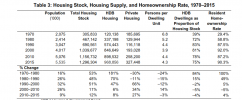Brendan Burgess
Founder
- Messages
- 55,579
The housing policy of Singapore is just astonishing in what it has achieved.

Between 1970 and 1990 home ownership increased from 29% to 87%.
At the moment, in Ireland, home ownership on retirement is 90%. But the ESRI expects that only 50% of people who are currently aged between 25 and 34, will own their own home on retirement.
I attach a good summary of the Singapore system and a full paper on it as well.
Brendan

Between 1970 and 1990 home ownership increased from 29% to 87%.
At the moment, in Ireland, home ownership on retirement is 90%. But the ESRI expects that only 50% of people who are currently aged between 25 and 34, will own their own home on retirement.
I attach a good summary of the Singapore system and a full paper on it as well.
Brendan